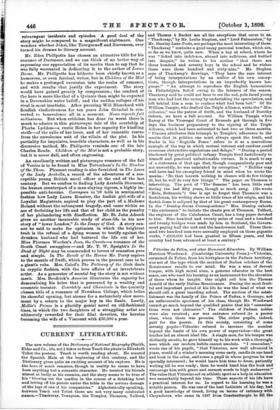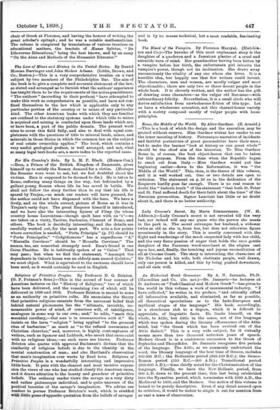Vittorino da Feltre, and other Humanist Educators. By William Harrison
Woodward. (Cambridge University Press.)—Vittorino, surnamed da Feltre, from his birthplace in the Paduan territory, was not of the type which the mention of Italian scholars of the Renaissance recalls to our mind. He was a man of devout temper, with high moral aims, a genuine educator in the best sense, one who used his learning as an instrument for the elevation of those whom he taught. One might call him the Thomas Arnold of the early Italian Renaissance. During the most fruit- ful and important period of his life he was the head of what we should call a great boarding school. The nucleus of the estab- lishment was the family of the Prince of Padua, a Gonzago, not an unfavourable specimen of his class, though Mr. Woodward cannot go much beyond the qualified praise that his " assassina- tions were not obtrusive." The children of Paduan nobles were also received ; nor was entrance refused ;to a poorer class, when there was promise. The richer pupils, indeed, paid for the poorer. In this society, consisting of some seventy pupils—Vittorino refused to increase the number beyond the limits of his own power of supervision—the great teacher led an almost ideal life. A single man, for his temper was distinctly ascetic, he gave himself up to his work with a thorough- ness which our modern habits cannot emulate. "I remember," wrote one of his pupils, " that Vittorino, now well advanced in years, would of a winter's morning come early, candle in one hand and book in the other, and rouse a pupil in whose progress he was specially interested ; he would leave him time to dress, patiently waiting till he was ready ; then be would hand him the book and encourage him with grave and earnest words to high endeavour." The value that Vittorino set on athletic sport as a help in education was remarkably beyond his time. These aspects of his life have a practical interest for us. In regard to his learning he was a notable person. He was one of the best Latinists of his day, bad a good knowledge of Greek, living on terms of intimacy with Chrysoloras, who came in 1397 from Constantinople to fill the
chair of Greek at Florenee, and having the honour of writing the great scholar's epitaph; and he was a notable mathematician. The volume is completed by translations of various treatises on educational matters, the tractate of Eneas Sylvius, " De Liberorum Educatione," being the best known, and by an essay "On the Aims and Methods of the Humanist Educator."







































 Previous page
Previous page